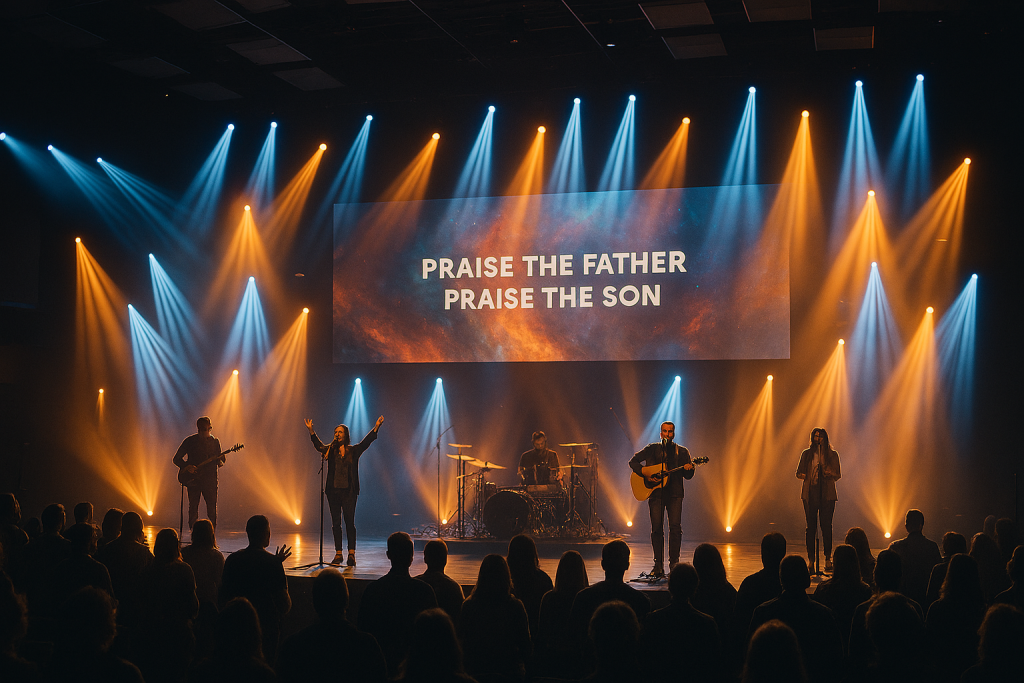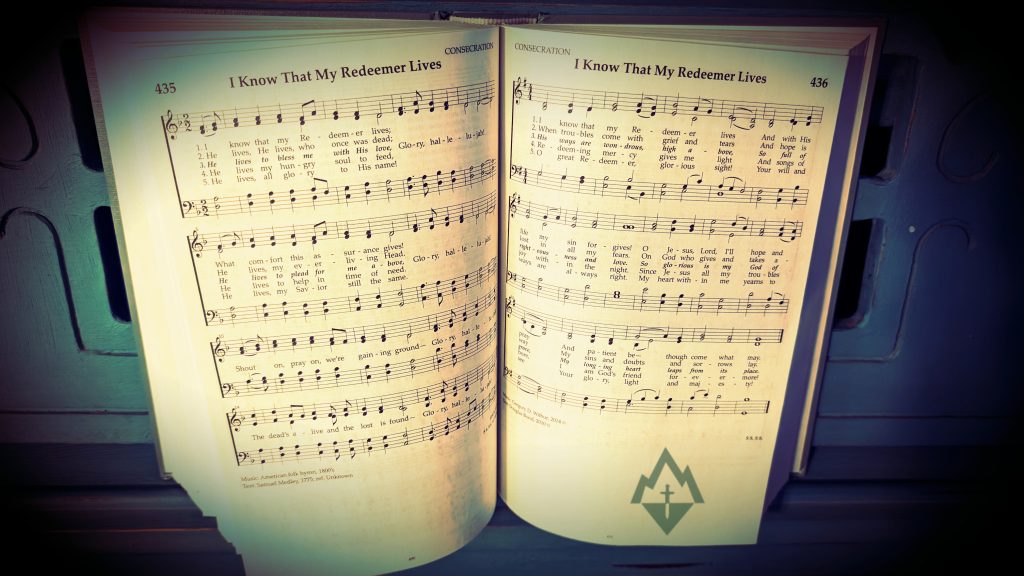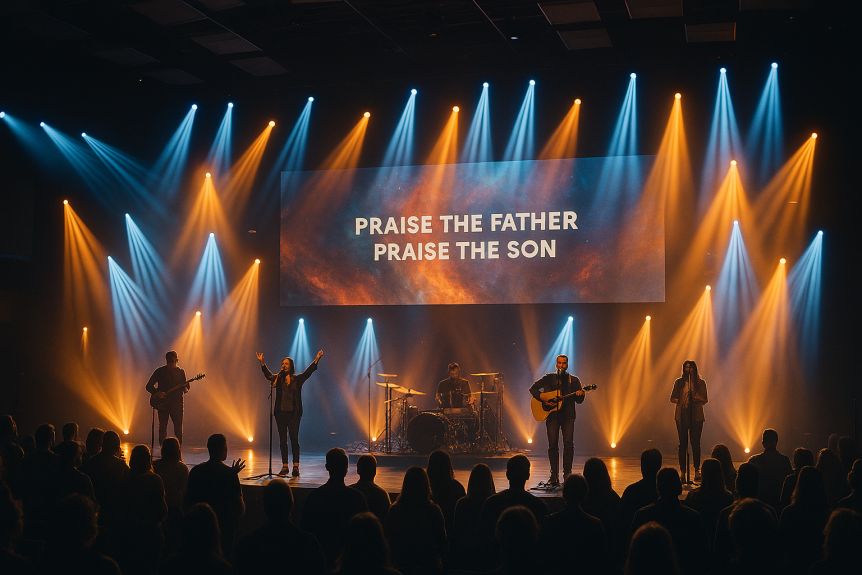By Pastor Gabriel Render
We Do Church Different Here
The Irony of Modern Worship
I found myself this past summer sitting with extended family on the Lord’s Day at church while vacationing out of state. First, I should point out that it is a unique blessing to visit family and have the majority not only be believers but wishing to attend church while on vacation (or at all for that matter).
This was your fairly typical non-denominational setting. It fit what I describe as the “We do church different here” vibe. I’m sure I’m not the only one that has noticed that refrain plastered across websites and used as the opening monologue in many a church welcome video. You know, the statement that tells you this church is going to look precisely like every other church not meeting in a traditional building that was planted in the last twenty-five years.
The door to the industrial warehouse turned worship center is opened by a series of greeters all of which smile and welcome and point you to coffee and kids check-in points—but fail to ask your name or offer theirs.
The hallways are crowded with a variety of people all seeming to have some assignment as they have taken those “next steps” in their faith (usually a one way ticket to “serving” i.e. rarely participating in corporate worship again).

Upon entering the sanctuary a stage is seen as centerpiece, complete with full audio and lighting rigging, bedecked with instruments and a simple stand/podium replaced the traditional pulpit.
As we approached our seats an older lady volunteer approached and asked if we wanted to participate in communion before proceeding to hand out pre-packaged cups of grape juice (the ones with the paper wafer under the first lid). As a Reformed Baptist I struggled with my conscience for a moment.
(see 1689 Chapter 30 and particularly 28.2) https://stonemountainchurch.com/confession/chapter-28/
What followed is what most would expect. The lights dimmed to a dark ambience to be offset by the production and spectacle of the worship band. I noticed that the room was only half-filled despite being the main 11am service (only to realize that many filtered in by the end of the second song). The room was devoid of children with only one other toddler besides my own daughter noticeable (Some families gathered in the hallway where the service was pumped to displays.)
Singing or Being Sung To?
One of the surprising realizations of modern worship is its commonalities with the Roman Catholic tradition. Roman churches have long debated the role of music in sacred liturgy as well as the appropriateness of congregational versus choral singing. (Congregational Singing | Catholic Answers Encyclopedia) It was often that the church was to be “sung to” rather than “sung with” when it came to psalms and hymns in the public gathering. Modern churches hold no such position, however, ironically contribute to a similar effect.

It stood out to me that once the music kicked in, it was not only quite difficult to hear anyone other than the band, but looking around many were not singing at all, but stood with crossed arms silently. Some (mostly women) mouthed the words, but if they audibly sang I could not tell. For all intents and purposes, worship was reduced to either performance, or a performative environment where private worship occurred. Other than physical proximity there wasn’t really anything corporate about this worship service.
The music was loud, the focus on emotion and atmosphere, and while the lyrics of the songs were generally better than many if not most modern churches, the melodies were unpredictable, unsingable, and varied by fills and spontaneous prayers, rendering them all the more something to consume rather than participate in.
The Exception
There was one song in the middle of the service that stood as a glaring exception. While I lament the unnecessary addition of a chorus/bridge, nevertheless they sang a hymn, and a glorious one at that- All Hail the Power of Jesus’ Name. The whole feeling of the room changed. The instruments were more understated and for the first time in the whole service I could not only see but hear actual singing in the congregation. For a moment relief flooded my soul, I sang loudly and treasured the voices of my family loudly participating in song— and then the weird bridge hit to be followed by more spontaneous prayer and feels-inducing keys accompanying. So close. But for a moment it was beautiful.
The service carried on. To be clear and charitable, the sermon was a verse-by-verse exposition, and the gospel was clearly communicated (albeit from a different soteriological and eschatological framework). While the applications were passive and no true call to repentance issued, some clear exegesis and exhortations was obvious and appreciated. The liturgy of the service was filled with prayer (though seemingly emotive and spontaneous) and Scripture (even a unison reading for call to worship). Overall, I had much to be thankful for, despite my observations.
This whole experience however drove home some points made during a sermon series earlier this year. Namely, why it is that my church practices not only congregational 4-part singing, but why we sing so many Psalms. That series was broken out in the following headings, and I think it is one that even conservative and reformed churches need to consider. Traditional singing isn’t merely for nostalgia but has weighty theological implications.
A Biblical Alternative
“O sing unto the Lord a new song; for he hath done marvellous things: his right hand, and his holy arm, hath gotten him the victory.”
Psalm 98:1
WHY We Sing
At the core of this topic is the simple question of why? Why do we sing at church, and for what purposed end? Is singing required? What should singing accomplish in the life of the believer, particularly in the corporate setting?
Many of us who have been in the church for any period of time recognize that we sing for various reasons: out of a love for God, a desire to speak truth back to God, to honor and exalt God, to obey various commands in Scripture, to encourage, rebuke, exhort and instruct etc.
Many of us also likely have preconceived notions and ill experiences in largely emotionally led worship settings common in the evangelical church broadly speaking. We ought to sing. We ought to worship through song, and we must seek to do so biblically.
Singing is in many ways a means of grace by which God ministers to us, and we one to another in mutual address.
HOW We Sing
How do we consider normative and regulative principles of worship? How do we employ our voices as instruments? How do we make use of instruments and technology well? Who should lead singing? All these questions are vital to consider if we are to ensure that God is properly glorified, and the saints edified in the process.
Generally speaking, we believe that the congregants’ voices should be the primary instrument employed. Further we believe that singing in four parts allows for everyone to find a part suitable for their range and comfort. This means that men needn’t be the quietest, nor struggle to sing high melodies, and that the ladies can naturally find the range that suits them to provide true harmony. Scripture exhorts us to “address one another” in our singing (Eph. 5:19) and this assumes that individual and distinct voices be heard in the congregation. This does not prohibit instruments, but assumes instrumentation compliment rather than drown out the voices.
Who should lead I will consider briefly. The intent of congregational singing is to emphasize the corporate nature of our singing and not put focus on any one in particular. As singing is primarily didactic in nature, we believe elder qualified men and gifted brothers should assist in leading or conducting the singing. The pastor is the primary worship leader in this sense, governing the selection of hymns as well as the direction on the Lord’s Day. As doctrine is to be taught by biblically qualified men, churches should strongly consider how the task of leading worship has been in many ways diminished to a musical aptitude test, rather than a doctrinal one.
It pleases me to see that our church has men who sing loudly, and this is something that is not common in many churches. While the range is part of the solution, the content also fuels that reality. Singing the full Psalter, including weighty ones like Ps. 137, or of God’s vengeance in Ps. 94 resonates with the men of our congregation as it did with the men whom God inspired to write them. Further, hymns such as The Son of God Goes Forth to War inspire a new generation of men to stand firm in trial.
“Let the word of Christ dwell in you richly in all wisdom; teaching and admonishing one another in psalms and hymns and spiritual songs, singing with grace in your hearts to the Lord.”
Colossians 3:16
WHAT We Sing
It is out of the abundance of Christ that the church sings. If we are to “let the word of Christ dwell” in us, then it is that word that pours forth primarily in our singing. There are multiple ways of interpreting the phrase “Psalms, hymns, and spiritual songs,” with one extreme seeing these as simply three categories within the psalter (exclusive psalmody) and the other extreme seeing there to be no restrictions as to what is permitted (see churches that employ secular music in “worship”). Categorically, we can see all three terms as harmonizing and extensions of one another. The Psalms are the shepherd’s song book that Christ and his disciples would have been well acquainted with and are fit for every occasion.
Hymns are other songs found in scripture or based upon scripture in a tight (if albeit paraphrased) fashion. We see songs in the Pentateuch, historical writings, prophets and in the NT writings of epistles (various doxology) and culminating in Revelation’s heavenly hymn of the lamb who is worthy. Hymns throughout church history have been written to closely reflect biblical truth and to keep the focus on instruction.

Spiritual songs have been largely abused to include any feeling or lyrics that a person simply possess and produce as a Christian. Here lies much of the disagreement. Hymns are not exclusively old (many modern hymns exist and are being written) and spiritual songs are not to be equated with contemporary either. As such, spiritual songs cannot be divorced from scripture and the intended subject matter but may focus more on a theme or truth taught, or merely a reaction to said truth (i.e. God’s mercy, or the martyrdom of saints). As I believe this is left intentionally vague to modern ears, we must have some charity in particular applications of this principle.
Most importantly, what we sing must be more about proclaiming biblical truth and less about how we feel. The joy of singing scripture is that in doing so, we inform our minds of glorious truths which guides our affections and emotions to be joyful. Put another way, the pursuit of emotional response is not the telos of worship, rather the right speaking of truth that honors and glorifies God should be, and by his grace often produces emotion as a biproduct. What we sing must be thoroughly scriptural. One needn’t fear the appropriateness of a lyric, or the relevance of a hymn when its contents are divinely inspired–why venture carelessly from this glorious safe haven as a standard?
WHY Does It Matter?
Singing will be a part of the eternal state. Why, how, and what we sing matters because it is rehearsal for the future glory of the resurrected church. Let us sing robustly, in unity, the rich truths fit for all occasions– joy, sorrow, indignation, triumph, and in gratitude worship the Triune God. Let us pursue that which is pure and lovely, true and good. Let us lay aside the foolishness of performative worship and be done with mood and emotional pursuits. Let us worship in Spirit and in Truth.
“Rise up, O men of God!
Rise up oh men of God, by William merrill
Have done with lesser things;
give heart and soul and mind and strength
to serve the King of kings.”

